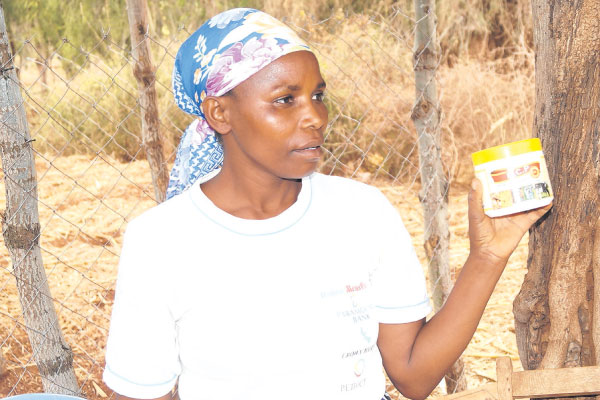Beatrice Mwingi leads us into a portion of her shamba that she has fenced off with wire mesh.
But before we can enter, we are required to dip our feet in a puddle of antiseptic at the gate. It is in this secluded section of the small farm that she has her chicken.
“Everyone coming in here must disinfect (their feet) so as not to bring in germs that may cause disease to my chicken,” she says.
This was one of the many lessons she learned the hard way after watching her flocks fall ill and die a few years ago.
The woman, who was well known at Kombo Village in Makima, Embu, and beyond for keeping big flocks of chicken, almost quit the venture after suffering heavy losses.
HARDLY VACCINATE THEM
“Not having the disinfectant was among several costly mistakes I was making that almost made me lose interest in chicken rearing,” she recalls.
But all this changed when she got a chance to train in disease prevention and management at the Kenya Agricultural Livestock Research Organisation (Kalro).
She learnt that her flocks had been dying of Newcastle disease, and that the disease kept recurring because she did not disinfect the chicken pens before restocking.
She also learned about coccidiosis, fowl typhoid, fowl pox and marek’s disease, which are equally common in the area.
“The other thing is that poultry farmers, especially those keeping kienyeji chicken, hardly vaccinate them against Newcastle disease, which is highly contagious and lethal.”
When Beatrice enrolled for the one-week course, all she wanted to know was how to confront the diseases that were snatching away her chickens. The skills she gained for Sh9,000 proved to be more than value for money.
“I could not just keep all this knowledge to myself, so I have become the village ‘guru’ on chicken rearing,” says the farmer who currently has 214 birds.
On our visit to her firm, Seeds of Gold finds Beatrice teaching a group of poultry keepers how to care for their birds. She displays for tins of minerals that she uses to supplement chicken feeds. One is Di Calcium Phosphate, which stops chicken from cannibalism.
Farmers who cannot afford the drug can apply aloe vera juice on victims of cannibalism. The plant’s bitter taste makes the culprits to stop pecking their prey.
Beatrice also displays Tylodoxi, an antibiotic that prevents respiratory diseases in the birds as well as an array of vitamins and other dietary supplements.
“From my training, I now know that chickens ought to be kept in a warm, dry place, eat a well-balanced diet and be let out to exercise and breathe fresh air,” she says, pointing to the space left between the fence and the coops.
That way, they can also forage for greens and peck on sand and eat bugs that have vital nutrients.
Farmers should also ensure chicken feeds are free from droppings. “They are a potential hazard to the health of the flock. It is important to use feeding troughs that ensure that the two do not mix.”
The informal teacher and field officer also shares with her friends home-made alternatives to good chicken care and management — knowledge she acquired by reading books she got from Kalro.
HOME MADE ALTERNATIVES
“I mash garlic and mix it in the feeds or throw onions for the chicken to peck at least once a week.” It is a secret many farmers do not know for keeping worms at bay, she says. An element in garlic and onions makes the environment in the gut less attractive to internal parasites and boosts the birds’ immune system.
She puts three cloves of crushed garlic in 10 litres of water or mixes two cloves for every meal. She feeds her chicken twice a day.
“I also regularly add sour milk in their feeds to ward off diarrhoea. It also helps when chicken are suffering from diarrhoea even when you are treating them with conventional drugs,” she says.
“I put just enough to cause lumps in the feed, but do not drench the feeds in it.”
These strategies have helped Beatrice reduce the incidence of diseases in her flock by almost 90 per cent.
“When you do this, you build the immune system of the birds and even though one bird can get sick, the disease is unlikely to spread to the rest as long as it is isolated as soon as you suspect it is ill.
“The best cure of all is always prevention,” she concludes.
Egerton University lecturer Sophie Miyumo says the ethno-veterinary methods of treating chicken work, but farmers must understand that it is important to strike a balance between the remedies and conventional methods.
“Many farmers keeping indigenous chicken refuse to vaccinate their birds, yet even as you use traditional remedies like these, it is important to incorporate important conventional methods which have been proved by science to work,” she says.
Did you love the story? You can also share YOUR story and get it published on Bizna Click here to get started.






